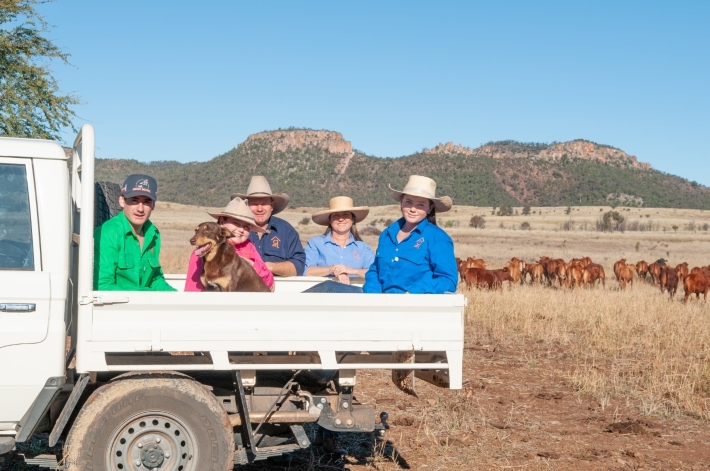It was back in 2007 that former UNE researcher Elaine Barclay and her colleagues discovered that less than 10% of Australian farms were inherited by women. More than a decade on, little progress appears to have been made, despite significant changes to gender roles on farms and broader labour force trends. With women now making up 50% of those graduating with agricultural degrees and comprising at least 30% of the agricultural workforce, evidence is mounting that Australian farming daughters continue to be disadvantaged by succession decisions that privilege farming sons.
"We know that roles within agriculture are changing but these changes do not appear to be reflected in family succession practices," says Emeritus Professor Alison Sheridan, a member of the research team. "Our preliminary research shows that keeping the family farm together still trumps gender equity and that masculine gender norms dominate. We want to explore the reasons why, from a socio-cultural, business and legal perspective."
The majority of Australian farms remain in family ownership and a growing number of ageing owners need to transition smoothly to retirement, so the research team believes the gender dynamics of farm succession have far-reaching implications. The agricultural sector can only continue to meet future food security challenges if it can draw from a talent pool that is inclusive of women farmers. However, gender discriminatory succession decisions could see many talented, educated women with considerable agri-business skills lost to larger metropolitan and regional centres, contributing to further rural and regional population decline. On a more personal level, such decisions limit opportunities for women's empowerment, inclusion and financial security.
"Discrimination has undesirable social and economic consequences for rural and regional communities," says Dr Lucie Newsome, from UNE's School of Business, whose research focuses on gender, politics and agribusiness. "Patterns of property transfer can influence the sustainability and flexibility of family farming, as well as the industry's ability to respond to our changing environment. Gender norms not only constrain women, but also men."
In a unique collaboration between researchers from UNE's Australian Centre for Agriculture and Law and Business School, the team will begin by conducting detailed interviews with a range of professionals in the succession space, including succession planners, financial advisors, rural legal experts and Rural Financial Counsellors, as well as representatives of agricultural groups like the Country Women's Association and National Farmers' Federation. They hope the pilot interviews will inform a deeper study of the gender dynamics of succession processes, inspiring new conversations and potentially new industry and policy initiatives.
Preliminary research has confirmed that strong patriarchal norms prevail in rural communities and that the desire to keep the family farm intact has a big bearing on succession decisions. Given the relative lack of test cases on the issue of sex discrimination and succession planning, few Australian women challenge discriminatory succession plans.
"Despite the wider social norms of women’s increasing participation in paid work and formal leadership roles, a key barrier to daughters being nominated as the successor in intergenerational transfers of family farms continues to be the social construct of both the farmer and the entrepreneur as masculine," Dr Newsome says.
Associate Professor Skye Saunders, an expert in sex discrimination law from UNE's School of Law, says analysis of Australian legal cases suggests that challenges to legal arrangements for farm succession are usually made on the grounds of unfair distribution of assets between siblings, rather than resting on accusations of gender discrimination.
"But in the legal and financial systems that shape and support Australian agriculture men are privileged," Skye says. "Women who may feel dissatisfied with their rural inheritance need courage, imagination and deep pockets to present an argument to the courts. Contesting farm succession means challenging the established way of doing things, which has been reinforced over generations, and indeed challenging the family identity."
For Queensland organic beef producers Brigid and Owen Price the solution is simple: their son and two daughters will each have the opportunity to pursue a career in the family’s business if they so desire. They have seen too much hurt in too many families that have handled succession poorly, and, instead, are committed to including all family members who want to contribute.
“A lot of the lessons we have learnt about succession are from observations of what has gone wrong for other people – the poor communication, unmet expectations, succession implosions and family disagreements,” Brigid says. “We have tried to separate the family business from the business of family. Our definition of succession success is that at Christmas time everyone wants to spend time together.
“Succession isn’t simple. It can cause a lot of deep hurt, to the point where family farms are broken up or sold due to disputes. That risks losing those families from a community and those people from our industry.
“In our family, there isn’t an assumption that our son will get everything. We are looking at how we give the opportunity, for all three of our children, to work on the land, in a way that is both viable and sustainable in the longer-term.”
The Prices belong to a generation of business-minded farmers confronting succession head-on. But until relatively recently the gender component of farm succession has attracted little scrutiny. That’s about to change, with a cross-disciplinary team from the University of New England now investigating the role of gender and the impacts of sex discrimination in a timely study called She'll Be Right.
The research team has just published their preliminary findings in the international journal Land Use Policy. Anyone interested in participating in the interviews can email efenton4@une.edu.au


